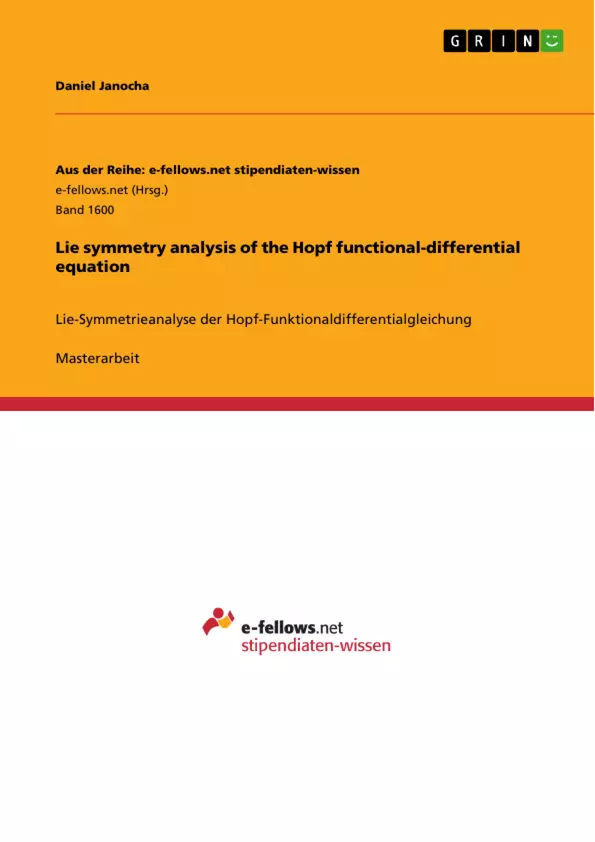In this paper, we extend the classical Lie symmetry analysis from partial differential equations to integro-differential equations with functional derivatives. We continue the work of OBERLACK and WACŁAWCZYK (2006, Arch. Mech., 58, 597), (2013, J. Math. Phys., 54, 072901) where the extended Lie symmetry analysis is performed in the Fourier space.
Here, we introduce a method to perform the extended Lie symmetry analysis in the physical space where we have to deal with the transformation of the integration variable in the appearing integral terms. The method is based on the transformation of the product y(x)dx appearing in the integral terms and applied to the functional formulation of the viscous Burgers equation.
The extended Lie symmetry analysis furnishes all known symmetries of the viscous Burgers equation and is able to provide new symmetries associated with the Hopf formulation of the viscous Burgers equation. Hence, it can be employed as an important tool for applications in continuum mechanics.
Frequently Asked Questions: Abstract on Lie Symmetry Analysis for Integro-Differential Equations
What is the main topic of this abstract?
The abstract discusses an extension of the classical Lie symmetry analysis from partial differential equations (PDEs) to integro-differential equations with functional derivatives.
What previous work does this paper build upon?
This work continues the research of OBERLACK and WACLAWCZYK (2006, 2013), where the extended Lie symmetry analysis is performed in the Fourier space.
What new method does the paper introduce?
The paper introduces a method to perform the extended Lie symmetry analysis in the physical space, addressing the transformation of the integration variable in integral terms.
What is the method based on?
The method is based on the transformation of the product y(x)dx appearing in the integral terms.
What equation is used as an application example?
The functional formulation of the viscous Burgers equation.
What are the capabilities of the extended Lie symmetry analysis described?
The extended Lie symmetry analysis furnishes all known symmetries of the viscous Burgers equation and can provide new symmetries associated with the Hopf formulation of the viscous Burgers equation.
What is the potential application of this method?
It can be employed as an important tool for applications in continuum mechanics.
What topics are covered in the table of contents?
The table of contents lists the following main topics: Introduction, Extension of Lie Symmetry Analysis, Lie Symmetry Analysis of the Viscous Hopf-Burgers Equation, Conclusions, Acknowledgements, and an Appendix on Infinitesimals of Dependent Variables.
What are the three complete descriptions of turbulence mentioned in the introduction?
The three complete descriptions of turbulence are: the multi-point correlation approach, the Lundgren-Monin-Novikov approach, and the Hopf approach.
What is a Hopf functional and how is it relevant to the context?
A Hopf functional is a characteristic functional used to describe the statistics of a turbulent flow. The document discusses using Lie symmetry analysis to study the viscous Hopf-Burgers functional integro-differential equation.
What is a functional differential equation (FDE)?
A functional differential equation is a generalization of a partial differential equation (PDE) where the number of independent variables tends to infinity.
What is a functional derivative?
A functional derivative measures the sensitivity of a functional to a small change in its input function.
What is meant by 'one-parameter Lie point transformations'?
One-parameter Lie point transformations are continuous symmetry transformations depending on a continuous parameter from a Lie group, which are used to find solutions to differential equations.
What are infinitesimals in the context of Lie symmetry analysis?
Infinitesimals are functions that define the local transformations of variables under a Lie group. They determine how the variables change infinitesimally under the symmetry transformation.
What is the infinitesimal generator in Lie symmetry analysis?
The infinitesimal generator is a differential operator that defines the infinitesimal transformation of the variables. It is used to derive the determining equations for the infinitesimals.
What is a determining system of equations for the infinitesimals?
The determining system of equations is an overdetermined set of linear partial differential equations that must be satisfied by the infinitesimals in order for the transformation to be a symmetry of the differential equation.
What is a symmetry-breaking restriction?
A symmetry-breaking restriction is a condition imposed on the system (such as a physical constraint) that reduces the number of symmetries that the system admits.
How are energy scaling and symmetry methods related to turbulence in this context?
Energy scaling behavior in turbulence can sometimes be related to self-similar solutions obtained using symmetry methods, providing insights into how energy is distributed across different scales in the turbulent flow.
How can a functional integro-differential equation be a viscous Hopf-Burgers equation?
The viscous Hopf-Burgers equation can be cast as a functional integro-differential equation by expressing it in terms of the Hopf functional, which involves integrals over the velocity field, thus combining functional and integro-differential aspects into a single equation.
Can the Lie Symmetry be applied to turbulence research?
Lie Symmetry Analysis is used in turbulence research to find symmetries, analyze invariant solutions, and study statistical properties in turbulent flow scenarios.
- Citar trabajo
- Daniel Janocha (Autor), 2015, Lie symmetry analysis of the Hopf functional-differential equation, Múnich, GRIN Verlag, https://www.grin.com/document/307089



